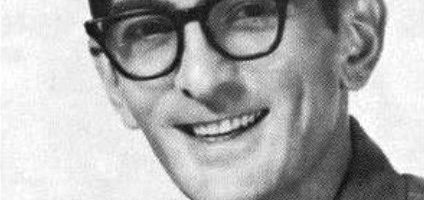If he wanted those cows milked, it was going to happen with the radio on.
Read More
Going Down the Old Mine with a Transistor Radio


If he wanted those cows milked, it was going to happen with the radio on.
Read More

Moving from Detroit to neighboring Huntington Woods in October, 1963 was a traumatic event for me. Due to the quirks of the Detroit school system, I skipped the second half of 5th grade. This made me the youngest in my 6th grade class at the Washington Elementary School, a K-6 school, where everyone had been together forever. They were now the top of the heap and didn’t take kindly to this runty stranger intruding on their top dog status. I was not welcomed into the clique.
I was immature emotionally and physically, well-prepared for the school work, just not the social environment, where the cliquish girls were already developed and interested in boys (and vice versa). Their mothers had their own clique; knew and socialized with one another. Mine had a nervous breakdown shortly after we moved in. She was unable to offer me guidance or support. My mother’s own self-loathing and feelings of inadequacy were projected onto me. I had no place of refuge.
The school girls mocked my appearance and clothing in very specific ways, isolating me instead of welcoming me. I withdrew and was miserable. I know these stories about mean girls are very typical at this age, but having been the brunt of them doesn’t make it easier.
Even though we all moved on to middle school the following year, I would not soon recover. I remember at the start of 8th grade, the popular girls (Huntington Woods had no schools, we went to school in the neighboring city of Royal Oak, but the Woods girls could be judgmental and harsh; the RO girls were in their own world too; I was nowhere), one of the HW girls declared a contest to see who could go the longest without repeating the same outfit! WHAT? I didn’t participate. I didn’t have that kind of wardrobe, nor did I care.
My mother harped on my looks: on my too large second teeth and glasses. I finally couldn’t stand being teased by the girls in 6th grade for not wearing a bra. Mother relented, but said loudly to the sales clerk that she didn’t know why I needed one, as I only had “mosquito bites!”
At the height of Mother’s depression, I had to do battle with her sister, in from Cleveland to care for us, since my mother didn’t stir from her bed for weeks. I had to switch from saddle shoes and tights to loafers and knee socks to avoid the contempt of the “queen bees”. My aunt called me a spoiled brat, but for me, it was a matter of survival.
Mother was very sensitive about being well-endowed. She grew up during the Flapper Era, when that wasn’t the look; she bound her breasts. And her own parents weren’t kind to her about her looks, calling her names like, “Ugly Connie”. Yet, when I look at photos of her as a young married woman, she looked so elegant.
She would never believe me. We all bear scars.
Perhaps I was supposed to be emotionally strong enough to slough off these remarks, but I wasn’t, I was young and sensitive. It was bad enough coming from the girls at school. It was devastating to get it from my own mother. I internalized it and thought I must be unbecoming and unworthy. It played into my relationships for years and years.
It was only going to the National Music Camp, beginning in 1964, that I found like-minded people, who were interested in the arts and valued me for my artistic endeavors, not how I looked or dressed (we wore uniforms). There, throughout the years, I made the friends of my lifetime and received some of the validation I so dearly sought. I remain in touch with many friends from my camp years and three of the girls I met between 1965-1968 remain among my closest friends. With the onset of the pandemic, a group of us have been Zooming about once a month.
Back at school, I finally made some good friends in 8th grade and moving on to Dondero High School in 9th grade, things changed dramatically. I had clubs and activities to get involved with that suited me, chief among them were the choirs and plays.
Years later, someone from my 7th grade class, with whom I had become friendly, told me she thought I was a snob back then. I was flabbergasted. I told her I was extremely shy, afraid of my own shadow and deeply wounded by the actions of others. Many people who gravitate towards acting are, in fact, very shy. Acting gives us a chance to become someone else; try on different personas. I guess I was a classic Ugly Duckling, who blossomed in 9th grade.
At Dondero, one had to audition for the top choirs, so I began in Girl’s Glee, then auditioned into Girl’s Choir in 10th grade and finally made it into A Cappella Choir (the top, mixed-voice choir) my junior year, led by Rick Hartsoe. That is the Featured photo. We each had our photo taken in our choir robe and the whole choir was put together in a massive portrait on the choir room wall. Rick gave me my portrait years later, while visiting me in Boston.
Choir met during one of our study hall periods, and I was truly happy to be there. I was a high soprano with an almost four octave range. Senior year, I was also in the Madrigal group (I believe there were 16 of us; again, we had to audition and be accepted in. We met at 7am, before school – a tough time for voices, but I loved being in the group). One particularly difficult song we sang was a “Swingle Singers” version of a Bach Fugue, popular at the time, with each vocal group taking a line of music, but jazz style, in conversation with the other vocal parts. Fiendishly difficult for us, it was also so much fun and rewarding to sing.
From the very beginning of high school, I was involved in all the plays (there were two each year, one musical, one straight play). I would be in one a year, but work on make-up for both, rising to the head of the make-up department, which could be a challenging task for a large musical production. I had to recruit others to do the make-up as well, make sure all the supplies were ready, teach everyone how to use theatrical make-up and give assignments. For “Arsenic and Old Lace”, I played Elaine, the lead’s love interest, but also did the special make-up for “Jonathan”, the Boris Karloff-like character, whom I was dating at the time. That’s another story.
We didn’t have an official drama club, though there is a national organization called the National Thespian Society. I looked into the requirements and, during my junior year, my high school was granted a charter to become a member. We held a candle light ceremony to inaugurate the club and I was its first secretary. I was thrilled to have helped bring the organization to my school.
I took four years of French and joined the French Club, though I don’t remember attending any meetings, and my senior year, I joined the Girl’s Literary Club. Besides putting on the spring semi-formal, I have no idea what they did, as I had no time, between singing and plays, to attend any of their meetings either.
I was a member of Junior Phi Beta Kappa and the National Honors Society. These were granted based on merit. We bought pins from all our clubs to adorn our mortar board during commencement.
During my virtual 50th high school reunion last autumn, I attached all those pins to a ribbon and posted them to our class Facebook page, just as we posted our graduation photos, and even our school IDs, if we still had them.
The dangling parts off to the side denote how many years I was in each club. I had a good run and through Choir and the plays, I met Patti, who also became my friend for life (and co-founder of Retrospect).
But my desire to avoid anything smacking of cliques has never left me. It influenced my college choice. Northwestern was my top choice until I learned from an older Huntington Woods friend, who was then enrolled there, that the school had a strong Greek life system. I ran in the other direction and chose Brandeis instead, which had no Greek life. I didn’t need to “pledge” and face possible rejection again. No sir!
I choose inclusion, in all forms.

This is the one, my old man says.
Read More

Clock-radio, transistor, car radio, boom box, record player-radio combo. All great for listening to my beloved rock 'n' roll.
Read More